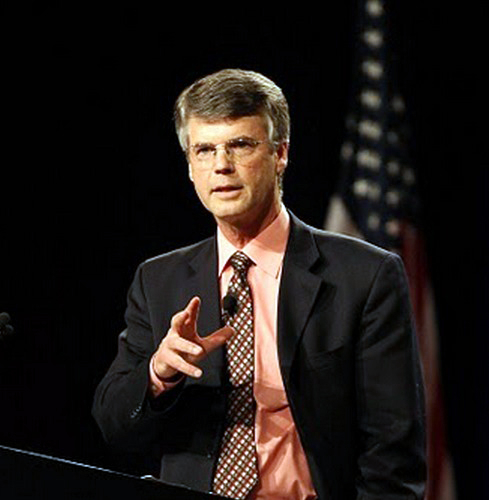Have Anti-John Doe Forces Blundered?
They could open door to federal court questioning state Supreme Court’s shutdown of Doe probe.
The John Doe case gets curiouser and curiouser.
The first, often called Doe I, investigated the Scott Walker county administration and the second, Doe II, the Walker campaign for governor. Much of the evidence remains under seal, which leaves many mysteries. Perhaps the biggest is the internal operations of the network that has emerged to oppose Doe II. Clearly the mastermind behind the anti-Doe network is Eric O’Keefe, profiled by Urban Milwaukee here. Others in the inner circle seem to be O’Keefe’s Washington attorney David Rivkin, and the Wisconsin Republican political consultants RJ Johnson and Deborah Jordahl.
Johnson and Jordahl were also targets of Doe II. In most court filings they are identified only as “unnamed movants 6 and 7,” in keeping with the general secrecy, in my view excessive, of the case.
Media champions of the anti-Doe network include M.D. Kittle of the conservative Wisconsin Watchdog, David French of National Review, and the editorial board of the Wall Street Journal.
The lawsuit in the name of Cindy Archer against Milwaukee DA John Chisholm and several of his staff is connected to the anti-Doe network: Rivkin is the lead attorney and Kittle has quoted O’Keefe as promising to raise money for the suit. But the suit increasingly looks like a blunder.
Doe I was conducted by the Milwaukee DA of the Walker county executive office and resulted in six convictions. Archer, a high official in the Walker administration, was under suspicion but never charged; a search warrant was executed on her home.
Doe II emerged from evidence found in Doe I suggesting Walker and his campaign coordinated their activities with supposedly independent groups, including Wisconsin Manufacturers and Commerce and O’Keefe’s Wisconsin Club for Growth. Doing so, without reporting the value of these activities as campaign contributions, would have violated then-existing state law. This remains illegal in federal elections.
Doe II triggered a highly coordinated campaign by O’Keefe’s group to fight not just the investigation, but the law that allowed it, the special prosecutor in charge of it, and the board that oversaw elections in Wisconsin. In the end the anti-Doe network succeeding in destroying all four.
The Archer suit charges the DA staffers in their personal capacities under section 1983 of the federal law, which allows suits against public officials for deprivation of constitutional and federal statutory rights by persons acting under “color of law.” Although brought in state court, the defendants quickly moved it to federal court.
The anti-Doe network had released a series of accounts alleging serious violations of people’s civil rights during the investigations, especially during the executions of the search warrants. These accusations included not serving search warrants, not reading people their Miranda warnings, and a general practice of bullying.
There was no way to independently test these claims and every reason to treat them with skepticism. They suggested a startling lack of professionalism on the part of the agents executing the warrants, and an approach that would likely be counter-productive to getting information.
Archer’s suit offered the first opportunity to compare alleged events to what actually occurred. The defendant investigators got permission to release documents on the search, including an audio tape and the warrant itself, which showed that none of the violations alleged in the complaint or widely reported in the right-wing media were true. As a result the court gave Archer’s attorneys permission to submit a revised complaint eliminating the untrue claims.
If one expected that eliminating these claims would lead to a shorter revised complaint, one would be mistaken. The complaint grew by ten pages. The initial complaint was limited to allegations concerning Doe I. But the extended second complaint adds a new section entitled “the Wisconsin supreme court’s repudiation of the investigation.” This section consisted mainly of the most incendiary quotes from the Wisconsin Supreme Court decision shutting down the investigation.
Including this section is puzzling. Why would the anti-Doe network invite the federal district court to weigh in on the validity of the Wisconsin Supreme Court’s decision? For instance, the Wisconsin court declared the targets of the probe “wholly innocent” because it accepted the Rivkin interpretation that coordination counts as a contribution only if such coordination involved communications that explicitly endorsed a candidate. For the federal district court to accept that theory would seem to put it at odds with the 7th Circuit and, ultimately, the US Supreme Court
Likewise, the claim by Wisconsin Attorney General Brad Schimel in his amicus brief to the federal court that the prosecutors illegally gained control of the evidence is based on accepting the Rivkin interpretation of the impact of the US Supreme Court’s Buckley’s decision of 1975, as the Wisconsin Supreme Court did. But even if one thinks the Rivkin interpretation is correct, it seems fundamentally unfair for Schimel to accuse the prosecutors of acting illegally when they were only following the law as written and understood at the time.
From the anti-Doe network’s viewpoint the best outcome seem to be for the district court to ignore this invitation to weigh in on the state supreme court’s decision.
A more immediate conflict between the Wisconsin Supreme Court majority and the federal court is the Wisconsin justices’ order to return the evidence and destroy any copies. This would make it much harder for the district court to assure a fair trial.
The Archer complaint’s more than 100 paragraphs of charges can be distilled to three issues:
- Whether there were violations of rights during the search, notably not reading her Miranda rights. That’s unlikely to go anywhere, because the reading is heard on the recording.
- Whether the investigation was motivated by Chisholm’s antipathy towards Gov. Walker and his Act 10 law decimating public employee unions. The complaint, essentially a recycling of claims in the earlier suit by O’Keefe against Chisholm, offers little evidence to support this charge. It is either circumstantial—that Chisholm is a Democrat—or based on testimony from a very suspect source—the late Michael Lutz. It also seems unlikely to go anywhere. The 7th Circuit Court of Appeals, in reversing federal Judge Rudolph Randa’s decision in favor of O’Keefe, rejected very similar claims of retaliation.
- Whether the investigation was so wide-ranging it became a fishing expedition. The fact that it resulted in six convictions does not in itself settle this charge; fishing expeditions can turn up crimes. Settling this requires a close look at the process. Did evidence of new crimes turn up as a byproduct of a specific search for evidence or did investigators take advantage of their possession of computers, for instance, to look for other crimes?
If the district court allowed the state supreme court’s order to return and destroy the evidence to be carried out, how could the investigators and prosecutors defend themselves from the charge of running a fishing expedition? Conversely, how could Archer prove her argument that it was a fishing expedition?
Both Rivkin and Attorney General Schimel have become born-again advocates of “comity”—the principal that federal and state courts should avoid interfering with each others’ processes, but they turn it into a one-way street, essentially arguing that state courts should be free to interfere with federal courts but not the other way around.
In their briefs opposing an order to preserve the documents, both Rivkin and Schimel almost demand the federal district judge endorse the state supreme court’s decision in the Doe II case. For example, Schimel’s first sentence notes that the Wisconsin Supreme Court accused the investigators of obtaining “numerous documents as part of an unlawful state-law investigation.” Why do they want to turn the Archer litigation, solely about actions in Doe I, into an examination of the validity of the decision shutting down Doe II?
There is evidence the state supreme court majority are deliberately trying to impede the ability of Chisholm, the prosecutors and investigators to defend themselves in the Archer suit, despite the fact that Archer is suing them in their personal capacities. As Justice Shirley Abrahamson charged, “the four justices have inserted themselves as gatekeepers of evidence and have denied [the Archer suit defendants] access to materials that may be essential against them as well as in threatened allegations of misconduct made in a pending federal lawsuit against them…”
In effect, the Archer lawsuit has opened a back door into the federal courts. It seems strange that the anti-Doe network is trying to expand this doorway by bringing up the state supreme court’s decision. O’Keefe has been remarkably successful in destroying Wisconsin’s regulations on election spending. By deciding to bring the Archer lawsuit, he may have put that success at risk.
Data Wonk
-
Scott Walker’s Misleading Use of Job Data
 Apr 3rd, 2024 by Bruce Thompson
Apr 3rd, 2024 by Bruce Thompson
-
How Partisan Divide on Education Hurts State
 Mar 27th, 2024 by Bruce Thompson
Mar 27th, 2024 by Bruce Thompson
-
Will Wisconsin Supreme Court Legalize Absentee Ballot Boxes?
 Mar 20th, 2024 by Bruce Thompson
Mar 20th, 2024 by Bruce Thompson

















Once again a very good explanation of the “goings on” in the John Doe I and II litigations. Please keep the public informed as the upcoming election to replace Justice Crooks is important to Wisconsin’s future elections . Crooks in his dissent of the case believed the law was clear,” a candidate cannot coordinate per federal law.” The motives of Gabelman et al and now Schimel to stop the public from hearing the truth as well as their belief that Wisconsin does not have to follow federal laws in elections should be put before the voters.Kloppenburg I bet would agree with Crooks, Bradley with Gabelman/Schimel.
On the actions of Eric O’Keefe, R.J. Johnson and the other anti-Doe forces, how much of the aggression is hubris and how much is bluff? Here in Wisconsin the GOP is in a protective bubble and control all the levers of power. Not so much on the national stage; Reince Priebus is overseeing the likely demise of the GOP as we know it, Paul Ryan has one of the worst jobs in the country, and the invincible Walker quickly became Governor Wallpaper in the first debate (to be fair, the Trump effect hit all the candidates).
This article is a great analysis of the legal factors involved and raises important questions about anti-Doe motivations and actions. Left out, however, is the risk O’Keefe, Schimel, et al run by spot-lighting the State Supreme Court decision when that invites a review of Prosser and Gableman regarding donations and decisions in view of Caperton v. Massey. That is a major risk.
I am glad that someone is keeping an eye on this. Mr Thompson and others may be interested to know that Mr O’Keefe is mentioned several times in the current book, Dark Money, The Hidden History of the Billionaires Behind the Rise of the Radical Right by Jane Mayer. The portrait of Mr O’Keefe that Ms Mayer sketches closely resembles the one painted by Bruce Murphy in his article on Mr O’Keefe which Mr Thompson references. (Bruce Murphy is also quoted in Ms Mayer’s book-see index). Mr O’Keefe and the rest of the Kochtopus machine are a huge threat to our democracy. The John Doe investigation should have been applauded, not given the seal of approval by the utterly corrupt State Supreme Court. I encourage everyone to read Ms Mayer’s book. It is even worse than you feared.